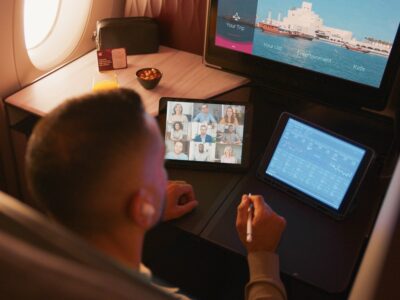Apple Computers is preparing to launch an Arabic version of its successful iPod music device this year, allowing users to navigate and store songs in Arabic for the first time, Arabian Business has learned.
The move, being conducted by the tech giant’s local partner Arab Business Machines, comes at a time when users have been grumbling about the lack of attention paid to Arab useability. The company is confident that the Arabisation of the iPod interface will significantly boost sales to tech-savvy Middle Eastern consumers. “iPods are already selling like hotcakes, but once Arabisation comes in, sales will explode,” said Elias Abou-Rustom, general manager, Arab Business Machines.
In the next month, Arab Business Machines is also set to unveil a fully Arabised version of its operating system, Mac OS 10 (codenamed ‘Tiger’).
The Arabisation, which aims to popularise the Apple Macintosh iBooks and iMacs software, is being undertaken by an Arab Business Machines team onsite in Deira, Dubai.
“We hope it will be popular and appreciated by the Arab society — it’s a huge segment of our market,” said Abou-Rustom. “More effort needs to be exerted to convert software into Arabic. But what will make the OS Mac 10 a success is the fact that the Arabisation is being done entirely in-house — not subcontracted — so the time-to delivery will be shorter, and the quality will be better.”
Currently, Abou-Rustom claims that the Mac OS 10 is “98%” localised — however, his team are working around the clock to fully Arabise all the short cuts and periphery capabilities of the system.
Eventually, he says, there will be no difference between the usability of the standard OS and the Arabised version. The new Arabic OS is set to come bundled with all Arab Business Machines’ computers.
Apple’s global revenue for the last three months of 2005 reached US$5.7 billion, more than the company expected, as iPod sales tripled and Macintosh computer purchases topped one million units for the fifth straight period. “Apple’s growing product line has seen significant success in the Middle East through 2005,” said Abou-Rustom. “While the iMacs continue their popularity in the region and worldwide, the iPods have become an iconic product for people across the region.”
The company’s global retail stores posted revenue of more than US$1 billion for the first time. Apple sold 14 million iPod music players and 1.25 million Macs. Apple sold 4.58 million iPods in the same period a year earlier, when total revenue reached US$3.49 billion.
Apple has sold eight million videos through its iTunes service since the online store introduced the feature, and the company has sold more than 850 million songs. While the company witnessed 26 million visitors during the holiday quarter in the retail stores. In addition, Apple has unveiled an iPod remote control and an FM tuner and is releasing a general update of Mac OS system software worldwide. Another significant move by Apple is its recent switch to Intel processors. In June 2005 Apple announced the switch to Santa Clara, from California-based Intel, the world’s largest chipmaker. The chips are faster and consume less power than Apple’s old Motorola and IBM products.






